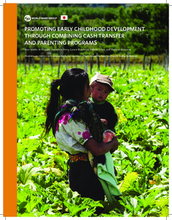This note and the accompanying full technical paper examine the existing evidence and the potential for bringing together cash transfer programs and parenting interventions to improve child development outcomes, notably cognitive performance. This work builds on an established body of literature that examines the nexus between cash transfer programs and nutrition and health outcomes (Black et al. 2015, Galasso et al. 2016, Leroy et al. 2009, Bastagli et al. 2016) as well as on existing operational guidance on how to combine cash transfers with nutrition interventions (World Bank, 2013).
Cash transfer programs are in a privileged position among public sector programs in that they are targeted to the poorest and most vulnerable families where deprivations such as chronic malnutrition and other indicators of poor child development are concentrated. They also benefit from a rich legacy of focusing on behavioral practices, particularly concerning parents’ investments in children.
Cash transfer programs can protect households against chronic poverty and financial risks, while also providing a way to leverage critical human capital investments, notably in young children. Poverty and human capital deficits are strongly correlated. Pro-poor cash transfer programs can help to mitigate the detrimental and long-lasting effects that poverty and its associated risks have on child development, supporting human capital accumulation and reducing inequality from early in life. Evidence from cash transfer programs reveal a range of early years impacts showing that these programs can (Bastagli et al. 2016, de Walque et al. 2017):
- Reduce poverty
- Mitigate negative impacts of early life shocks (Adhvaryu et al. 2017)
- Improve food consumption and, in some cases, nutritional outcomes (stunting, wasting) • Improve children's cognitive and language skills (see Figure 2)
- Increase the use of health services by pregnant women and young children
- Reduce morbidity and, in some cases, infant mortality
- Reduce maternal depression and stress, enhancing household environment for child development

